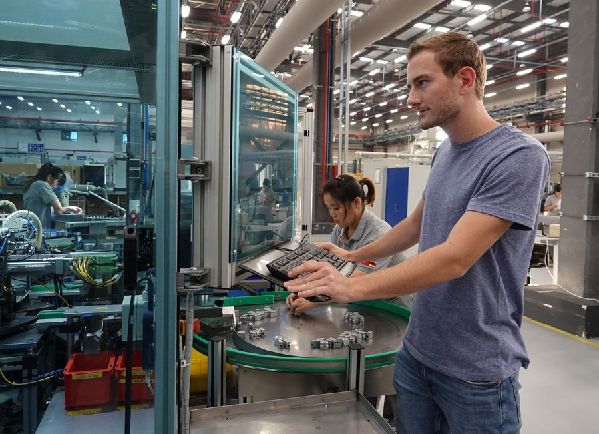|
Service outsourcing can accelerate China's rise up in global value chain
( chinadaily.com.cn )
Updated: 2020-01-06
|
|||||||||
 |
|
A German engineer operates equipments in the IMS Gear (Taicang) Co Ltd in Taicang, East China's Jiangsu province, Oct 31, 2019. [Photo/Xinhua] |
THE STATE COUNCIL, China's Cabinet, held its first executive meeting of the year on Friday, at which measures were proposed to promote the transformation and upgrading of the service industry and accelerate the outsourcing of services.
Zhengnengliang, a WeChat account that specializes in policy analysis, comments:
The meeting proposed to use information technology to promote "services plus" and accelerate capacity building for outsourced services.
Service outsourcing is at the forefront of the development of a modern market economy. It means that enterprises will outsource certain links or processes in their production and management processes to specialist companies, thereby reducing costs, improving efficiency and giving full play to their respective advantages.
R&D, accounting, law, marketing, even maintenance can all be outsourced. Thanks to the fast development of the internet, it is now quite convenient for enterprises to find a company to provide the services they require.
Service outsourcing also helps raise the quality of the service sector. For a long time, Made in China has been supporting the stable growth of China's economy. However, Chinese manufacturing enterprises are at the low end of the global industrial chain and they do not get so much added value from the whole process.
With the prosperity of the service sector, there can be Services in China later, which can help Chinese enterprises claim a higher place in the global value chain.
As early as 2009, the State Council issued a list of exemplary cities in terms of service outsourcing, and there are now 31 cities on the list. Since 2014, the State Council has been constantly updating a guideline list on key service outsourcing sub-sectors, with further support to key sectors such as information technology and knowledge.
From their past evaluations, it can be seen that there is still an imbalance among different regions, with some of them having too simplified structures. The meeting has raised new guiding principles for service outsourcing.
That in turn requires regulatory departments to adopt new thinking. It is advisable for them to take a cautious attitude and allow service outsourcing industries to have their own space.
It is also advisable for various levels of government departments to outsource services, too, and help service companies to grow by purchasing their services. Especially in fields such as care for the aged, preschool education, and medical services, it is better to let enterprises and other social organizations grow.

